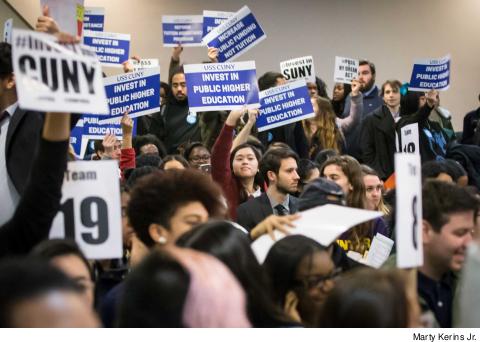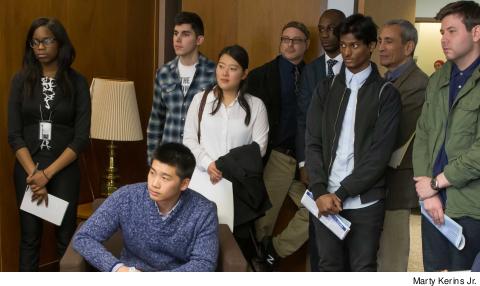Intense state lobbying push
 |
As Clarion went to press, Governor Andrew Cuomo and the leaders of the two houses of the State Legislature were in the final negotiation stages of delivering a state budget. This marked the closing stage of an intense effort led by the PSC and other CUNY advocates, including the University Student Senate (USS), for an increase that would fully fund CUNY after years of disinvestment.
Specifically, the central demand of this union-led effort was clear: the state must provide CUNY with an increased funding stream of $298 million, which would add $80 million to the budget to cover 1,000 new full-time faculty lines and raise the per-course pay for adjuncts to $7,000. And the delivery of this demand came in many forms, from hours of phone calls to state representatives from rank-and-file members to several lobbying trips to Albany with the PSC and its parent union, New York State United Teachers.
All of these efforts have come together in a massive effort to get a budget that fully funds higher education in the state.
While on one of the lobbying trips to Albany, Queens College PSC Chapter Chair David Gerwin made the point to lawmakers that there is an interconnected struggle between different types of CUNY workers: low pay for adjuncts adversely affects full-time instructors, and a lack of administrative workers puts a bigger burden on pedagogical workers.
“One of our adjuncts is a full-time high school teacher, so her time on campus is tight,” he told Clarion. “Seven thousand dollars per course would get her attention in a very different way. Then she could cut back on high school teaching and this could be more of her identity.”
He also noted that a depletion among HEOs on his campus had forced full-time faculty members to take on more administrative duties, distracting them from classroom and research responsibilities.
“We need more HEO staff, so there’s more sharing of the load,” Gerwin said. “We are losing our capacity to do research.”
LEGISLATIVE SUPPORT
Gerwin, reflecting on his hours lobbying with fellow union members and USS activists for the full funding of CUNY in Albany, seemed optimistic that lawmakers in both houses and from both parties understood the importance of funding higher education in the state and took the testimony from the many CUNY student advocates to heart.
In pushing for a state budget that fully funds public higher education, the PSC produced a television ad featuring a day in the life of student Fatime Uruci of John Jay College.
“I wake up most mornings at 6:30 a.m., in time to say goodbye to my mom, who goes to work at 7 a.m.,” she is heard saying in the ad, as the camera follows her from her home on her laborious bus and subway commute to John Jay College’s Manhattan campus, where she studies English. “CUNY is amazing. There are students from every background, immigrants from everywhere, students from poor families or working families like mine. We come to CUNY because we know it can provide a pathway to achieving our dreams.”
In the ad, Uruci highlights how there is a important discussion going on in the state about making CUNY more affordable, but that can only be achieved with addressing the severe austerity the state has placed on CUNY’s workforce and students.
Full-time enrollment at senior colleges increased by 10 percent from 2008 to 2015, but in that same time period, per-student funding from the state fell 17 percent, when adjusted for inflation. Full-time enrollment increased 23 percent at community colleges over the same period, with a 5 percent drop in per-student state funding, when adjusted for inflation.
NECESSARY INVESTMENT
“But a lot of my friends can’t take the courses they need to graduate on time, because there aren’t enough faculty. And most of the professors are part-time, rushing from job to job,” Uruci said. “Albany is talking about college affordability. Affordability is important, but it won’t be meaningful without investment in the classroom.”
There are some signs things might be moving in the right direction as the deadline for a budget approaches. At the end of March, the two legislative houses offered their “one-house bills,” which are their respective bargaining positions in the budget process, and for the PSC and other CUNY advocates there is some good news coming out of that process.
 |
“We commend the New York State Senate and Assembly for the funding restorations included in both one-house budgets, particularly on mandatory cost increases,” PSC President Barbara Bowen said in a statement. “Both the Senate and the Assembly responded to the voices of PSC members and included in their one-house budgets maintenance of effort language to fully cover CUNY’s mandatory cost increases, including collective bargaining increases. It is essential that the enacted budget fully fund the cost of the university’s basic contractual commitments to its employees.”
PRESSING LAWMAKERS
Bowen continued, “Now we call on the legislature and the executive to increase CUNY operating aid in the enacted budget so that students seeking a better life with a CUNY degree will have the resources they need.”
Bowen commended both houses for calling for the expansion of the Tuition Assistance Program (TAP) for part-time students, but she raised other concerns. “Greater investment is needed,” she said. “The university struggles to provide the resources needed for high-quality college education even for current students. Increasing access to CUNY without significantly increasing investment would mean that resources are even further strained.”
Bowen continued, “Even without additional students, CUNY operates with a shortage of 4,000 full-time faculty and relies on the underpaid labor of more than 12,000 adjunct faculty, who teach more than half of its courses. Any free tuition or affordability initiative in the enacted state budget must include funds to allow the university to begin to fill the gap in full-time faculty positions, provide additional support for adjuncts, and strengthen the student support services that keep students on pace to graduate.”
The University Student Senate (USS), which supports increased funding for more full-time faculty and pay raises for part-time instructors, has also denounced the proposed $250 tuition increase. While acknowledging that Governor Cuomo’s proposed Excelsior Scholarship would provide tuition-free education for many middle-income full-time students at CUNY and SUNY, advocates have said his plan would not increase TAP funding for low-income students or address the hundreds of dollars low-income students must spend on books, transportation and other related fees.
“He wants tuition to bear that cost and we’re saying ‘no,’” City Council Higher Education Chair Inez Barron said at a USS-hosted City Hall rally for increased CUNY funding on March 22. “It is the responsibility of the state to provide education.”
As Clarion went to press, the USS announced a March 29 march over the Brooklyn Bridge to call attention to the state’s systematic underfunding of CUNY.
ELECTORAL PRESSURE
Hercules Reid, the USS vice chair for legislative affairs, said at a City Hall rally that CUNY advocates needed to continue putting pressure on lawmakers in both parties and in both chambers to increase funding for CUNY and to ensure its affordability for students.
With an eye toward 2018 primaries and general elections, Reid invoked CUNY’s student body of 500,000 potential voters and offered a warning to lawmakers who failed to make fully funding public higher education a priority this year: “Watch out.”

